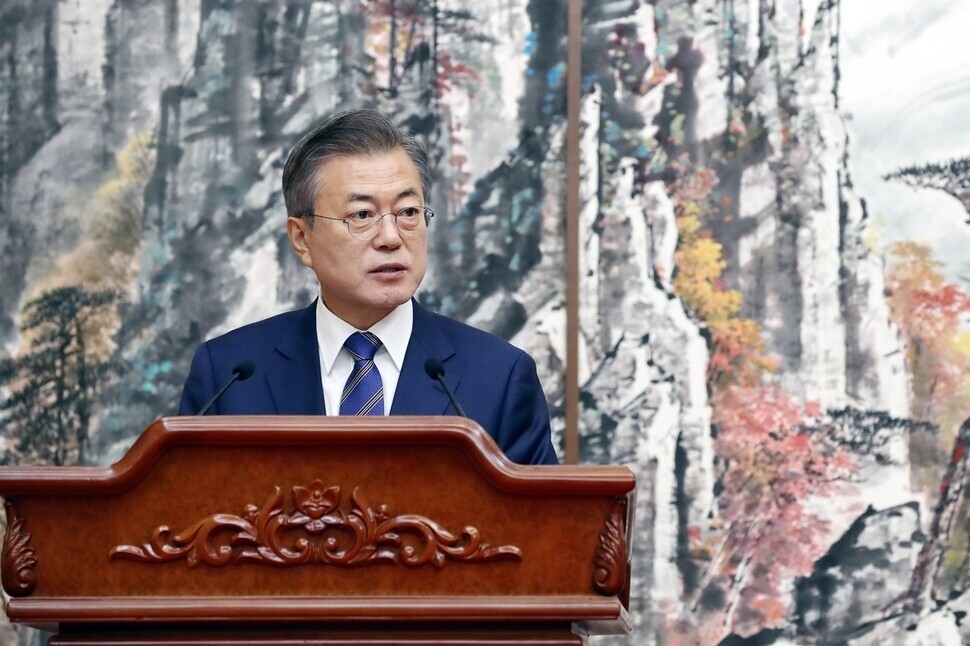hankyoreh
Links to other country sites 다른 나라 사이트 링크
Moon calls for inter-Korean pledges to be honored, dialogue to be continued

Former South Korean President Moon Jae-in stressed that there can be “no peace without dialogue” in remarks shared Sunday for the fourth anniversary of South and North Korea’s Pyongyang Joint Declaration and Sept. 19 military agreement in 2018.
“The only way for us to take even a step forward is when we become the leaders creating and unwaveringly pursuing peace on the Korean Peninsula,” he declared.
In his first official message since leaving office earlier this year, Moon reiterated the importance of Seoul and Pyongyang assuming leadership in creating peace on the peninsula at a time when his successor Yoon Suk-yeol has come out with an “audacious initiative” emphasizing international coordination on the North Korean nuclear issue.
Moon’s celebratory address was shared in a press release issued Sunday by Democratic Party lawmaker Youn Kun-young. The written address was released by Moon a day ahead of a roundtable commemorating the fourth anniversary of the September 2018 military agreement.
“The July 4 South-North Joint Communique [in 1972], the South-North Basic Agreement [in 1991], the June 15 Declaration [in 2000], the October 4 Declaration [in 2007], the Panmunjom Declaration [in 2018], and the Pyongyang Joint Declaration were all historic agreements that emerged amid difficult conditions from a process of frank dialogue and negotiations and understanding the other side’s position,” he emphasized.
“They are pledges that should be respected and honored even after the administration has changed,” he added.
He went on to say, “While the current situation is one of tall barriers of distrust and formidable foreign affairs and national security challenges, the only way we can proceed onto the road of peace is when we overcome and navigate the situation from a position of leadership rather than succumbing to pessimism.”
He also stressed that North Korea “must not abandon our agreements.”
Assessing the September 2018 agreement in his remarks, Moon said that it “provided a practical road map for denuclearization as South and North agreed on a denuclearization plan for the first time.”
He also reflected on the impasse that inter-Korean relations entered after the breakdown of a North Korea-US summit in Hanoi in February 2019.
“This was a moment that truly brought home how difficult it is to institutionalize peace and establish sustainable peace on the Korean Peninsula,” he said.
With Moon issuing his first official remarks after remaining quiet on the political situation in and around South Korea for over four months since leaving office, many observers are watching to see what comments he shares on inter-Korean issues and other matters going forward.
“When it comes to matters of peace, there are no distinctions of ‘ruling party’ and ‘opposition,’” Youn Kun-young told the Hankyoreh.
“I’m sure that [Moon] will play whatever role is needed from him as a former president, although I cannot predict what will happen going forward,” he continued.
Another celebratory statement was shared the same day by Democratic Party leader Lee Jae-myung, who delivered a blistering criticism of the Yoon administration’s North Korea policy.
“The waves of military tension have rapidly risen around the Korean Peninsula since the inauguration of the Yoon Suk-yeol administration, which has proclaimed a hard-line stance on North Korea and indicated its willingness to consider a preemptive strike,” he said, adding that the “clock for peace on Korean Peninsula has now been fully turned back to before 2018.”
In response, he stressed that “expensive peace is better than winning a war.”
“Rather than simply preserving peace, we should be deploying a practical and creative strategy to create or establish peace,” he urged.
By Um Ji-won, staff reporter
Please direct questions or comments to [english@hani.co.kr]

Editorial・opinion
![[Editorial] Intensifying US-China rivalry means Seoul must address uncertainty with Beijing sooner than later [Editorial] Intensifying US-China rivalry means Seoul must address uncertainty with Beijing sooner than later](https://flexible.img.hani.co.kr/flexible/normal/500/300/imgdb/original/2024/0517/8117159322045222.jpg) [Editorial] Intensifying US-China rivalry means Seoul must address uncertainty with Beijing sooner than later
[Editorial] Intensifying US-China rivalry means Seoul must address uncertainty with Beijing sooner than later![[Column] When ‘fairness’ means hate and violence [Column] When ‘fairness’ means hate and violence](https://flexible.img.hani.co.kr/flexible/normal/500/300/imgdb/original/2024/0516/7417158465908824.jpg) [Column] When ‘fairness’ means hate and violence
[Column] When ‘fairness’ means hate and violence- [Editorial] Yoon must stop abusing authority to shield himself from investigation
- [Column] US troop withdrawal from Korea could be the Acheson Line all over
- [Column] How to win back readers who’ve turned to YouTube for news
- [Column] Welcome to the president’s pity party
- [Editorial] Korea must respond firmly to Japan’s attempt to usurp Line
- [Editorial] Transfers of prosecutors investigating Korea’s first lady send chilling message
- [Column] Will Seoul’s ties with Moscow really recover on their own?
- [Column] Samsung’s ‘lost decade’ and Lee Jae-yong’s mismatched chopsticks
Most viewed articles
- 1[Editorial] Transfers of prosecutors investigating Korea’s first lady send chilling message
- 2[Column] US troop withdrawal from Korea could be the Acheson Line all over
- 3[Exclusive] Unearthed memo suggests Gwangju Uprising missing may have been cremated
- 4Xi, Putin ‘oppose acts of military intimidation’ against N. Korea by US in joint statement
- 5‘Shot, stabbed, piled on a truck’: Mystery of missing dead at Gwangju Prison
- 6[Column] When ‘fairness’ means hate and violence
- 7Spotlight turns to Hyundai Group Chairwoman’s visit to North Korea
- 8[Column] Samsung’s ‘lost decade’ and Lee Jae-yong’s mismatched chopsticks
- 9[Column] Will Seoul’s ties with Moscow really recover on their own?
- 10[Editorial] Intensifying US-China rivalry means Seoul must address uncertainty with Beijing sooner t